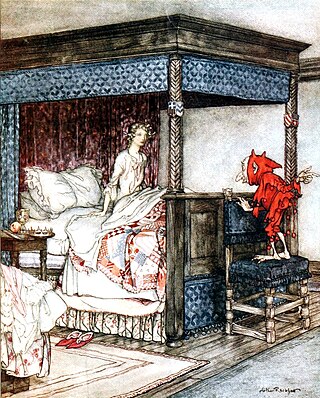Synopsis
In one set of variants, the Englishmen threaten his mistress to make her betray him. When he arrives, she confesses. He forgives her, borrows her clothing, and makes his escape. In some of these, the ballad then goes on to include the events in the other set.
In another, Wallace asks a woman for news, hears of English soldiers hunting for him, goes up to them in disguise and kills a number, and returns home to dine with his men.

TamLin is a character in a legendary ballad originating from the Scottish Borders. It is also associated with a reel of the same name, also known as the Glasgow Reel. The story revolves around the rescue of Tam Lin by his true love from the Queen of the Fairies. The motif of winning a person by holding him through all forms of transformation is found throughout Europe in folktales.

Hans Fredrik Gude was a Norwegian romanticist painter and is considered along with Johan Christian Dahl to be one of Norway's foremost landscape painters. He has been called a mainstay of Norwegian National Romanticism. He is associated with the Düsseldorf school of painting.

Billy Blind is an English and Lowland Scottish household spirit, much like a brownie. He appears only in ballads, where he frequently advises the characters. It is possible that the character of Billy Blind is a folk memory of the god Woden or Odin from Germanic mythology, in his "more playful aspect" and is speculated to have been the same character as Blind Harie, the "blind man of the game" in Scotland.
"Lady Isabel and the Elf Knight" is the English common name representative of a very large class of European ballads.
The Famous Flower of Serving-Men or The Lady Turned Serving-Man is a traditional English language folk song and murder ballad. Child considered it as closely related to the ballad "The Lament of the Border Widow" or "The Border Widow's Lament".
"Unusually, it is possible to give a precise date and authorship to this ballad. It was written by the prolific balladeer, Laurence Price, and published in July 1656, under the title of The famous Flower of Serving-Men. Or, The Lady turn'd Serving-Man. It lasted in the mouths of ordinary people for three hundred years: what a tribute to the work of any writer, leave alone the obscure Laurence Price. Oral tradition, however, has made changes. The original has twenty-eight verses and a fairy-tale ending: “And then for fear of further strife, / he took Sweet William to be his Wife: / The like before was never seen, / A Serving-man to be a Queen”. – Roy Palmer, A Book of British Ballads
Willie's Lady is Child ballad number 6 and Roud #220. The earliest known copy of the ballad is from a recitation transcribed in 1783.
"Geordie" is an English language folk song concerning the trial of the eponymous hero whose lover pleads for his life. It is listed as Child ballad 209 and Number 90 in the Roud Folk Song Index. The ballad was traditionally sung across the English speaking world, particularly in England, Scotland and North America, and was performed with many different melodies and lyrics. In recent times, popular versions have been performed and recorded by numerous artists and groups in different languages, mostly inspired by Joan Baez's 1962 recording based on a traditional version from Somerset, England.
"The Wee Wee Man" is an Anglo-Scottish border ballad, existing in several variants.

"Hind Horn" is a traditional English and Scottish folk ballad.
"Hind Etin" is a folk ballad existing in several variants.
Child Waters is an English-language folk song, existing in several variants.
The Duke of Gordon's Daughter is #237 of the Child Ballads, the collection of 305 ballads from England and Scotland, and their American variants, collected by Francis James Child in the late nineteenth century. The collection was published as The English and Scottish Popular Ballads between 1882 and 1898 by Houghton Mifflin in ten volumes and later reissued in a five volume edition.
"The Fair Flower of Northumberland" is a folk ballad.
"The Broomfield Hill", "The Broomfield Wager" "The Merry Broomfield", "The Green Broomfield", "A Wager, a Wager", or "The West Country Wager" (Child 43, Roud 34) is a traditional English folk ballad.
"Gil Brenton" is an English-language folk song, existing in several variants.
Brown Robin is a traditional English-language folk song. The ballad tells the story of a king's daughter who brings her lover, Brown Robin, into the castle and back out without being discovered by the king. The second variant comes from the ballad "Love Robbie."
"Erlinton" is an English-language folk ballad. One variant features Robin Hood, but this variant forces the folk hero into a ballad structure where he does not fit naturally.
"The Baffled Knight" or "Blow Away the Morning Dew" is a traditional ballad existing in numerous variants. The first-known version was published in Thomas Ravenscroft's Deuteromelia (1609) with a matching tune, making this one of the few early ballads for which there is extant original music. The song was included in such notable collections as Pills to Purge Melancholy by Thomas d'Urfey (1719–1720) and Reliques of Ancient English Poetry by Thomas Percy (1765).
"Brown Robyn's Confession" is an English-language folk song.
"The Lochmaben Harper" or "The Blind Harper" is a traditional British Folk ballad and is one of the ballads collected by Francis Child in The English and Scottish Popular Ballads (1882–1898).
This page is based on this
Wikipedia article Text is available under the
CC BY-SA 4.0 license; additional terms may apply.
Images, videos and audio are available under their respective licenses.



